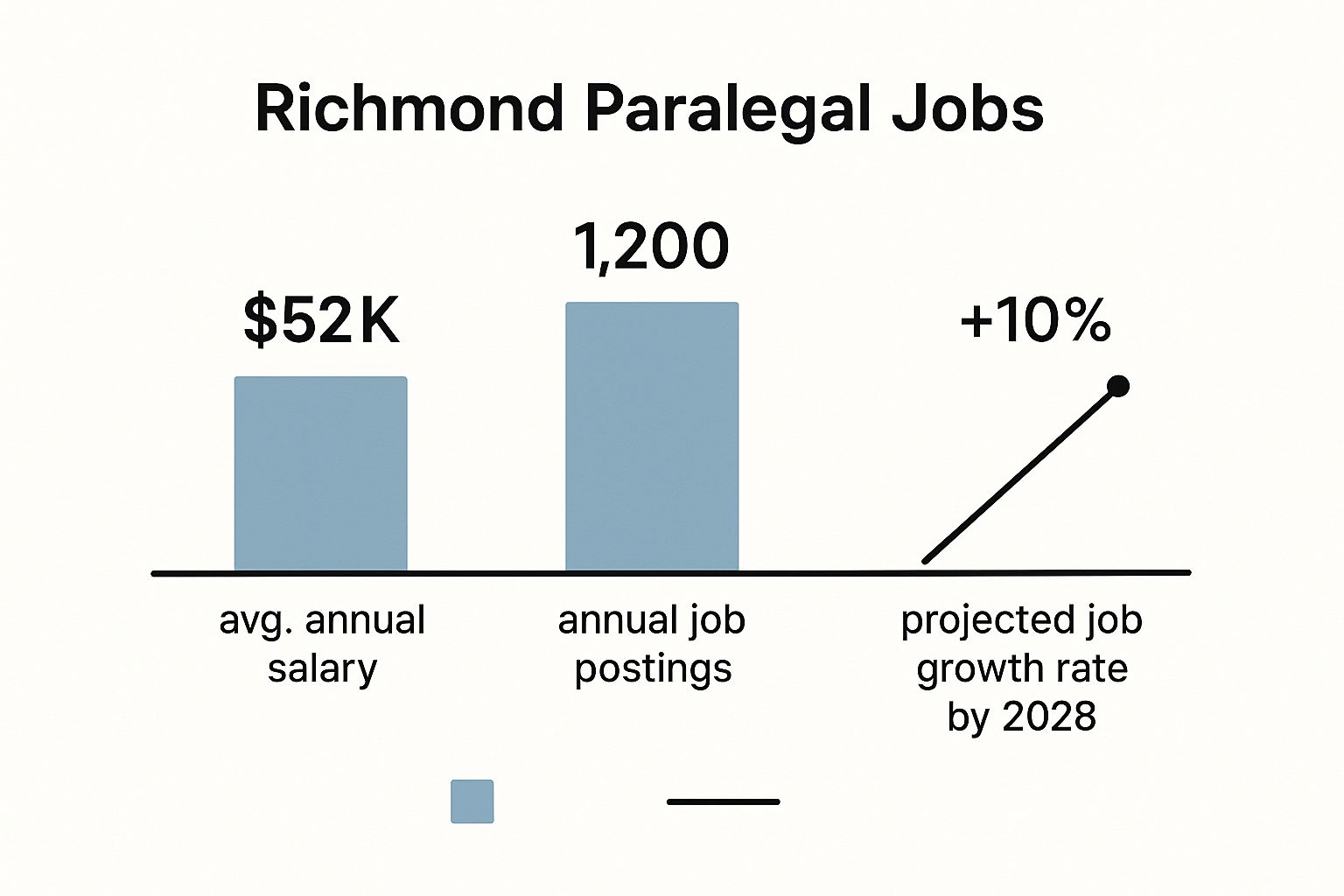
 16 minutes read
16 minutes read
Let's get straight to it. You're scrolling through job postings, and every paralegal role in Richmond starts to look the same. Here’s the deal: Richmond is a major legal hub, which means two things—tons of opportunity and a whole lot of competition. Firing off a generic resume is like screaming into the void.
This guide isn't about fluff. It's a field manual for actually getting noticed in a city where "legal professional" is practically a default job title.
Forget what you know about the typical job hunt. Sending your resume into the black hole of online applications is a strategy for disappointment. To actually land one of the top paralegal jobs in Richmond, VA, you need to understand the city's unique legal ecosystem. It's a game, and you need to know the players.
This isn't just about tweaking your resume. It’s about making yourself the candidate they have to talk to. That means knowing who's who, from the corporate Goliaths downtown to the niche boutique firms that don't even bother with the big job boards.
So, what does the Richmond market really look like? It's a powerhouse, thanks to being the state capital and home to some massive law firms. Think heavy-hitters like McGuireWoods and Hunton Andrews Kurth. They're not just law firms; they're institutions that create a constant, churning need for sharp paralegals.
The numbers don't lie.

The data tells a clear story: with over a thousand job postings a year and a projected 10% growth rate, the opportunities are there. But so is the competition for those solid salaries.
Speaking of which, let's talk about the money.
Navigating compensation is a minefield. Go in unprepared, and you'll leave money on the table. Understanding the typical salary bands in Richmond gives you the leverage you need. Here's a quick and dirty breakdown.
| Experience Level | Typical Annual Salary Range | Key Influencing Factors |
|---|---|---|
| Entry-Level (0-2 years) | $45,000 – $60,000 | ABA-approved program, internships, knowing your way around software like Clio or MyCase. |
| Mid-Level (3-7 years) | $60,000 – $75,000 | A real specialty (litigation, real estate), a serious certification, and e-discovery chops. |
| Senior/Specialist (8+ years) | $75,000 – $95,000+ | Managing others, handling the gnarliest cases, and having an in-demand niche (think IP). |
Remember, these are just benchmarks. A paralegal who's a wizard with e-discovery at a huge corporate firm will laugh at the salary of a generalist at a small family law practice. Your ability to demonstrate specific, high-value skills is what pushes you into the higher tax brackets.
In a market this crowded, hiring managers use credentials as a weed-out filter. A degree gets you in the game, but certifications are what make your application jump to the top of the pile.

Think of it this way: your resume gets you in the door, but a specialized certification proves you can do the job before you even sit down for the interview. It’s a trust signal that screams competence.
Firms want to see you've invested in yourself. While there isn't just one path, taking the time to understand the different paralegal certification requirements gives you a massive leg up. It shows you’re not just looking for a paycheck; you're building a career.
Let's be real. Not all paralegal jobs in Richmond VA are created equal. You've got state government, sprawling corporate law firms, and an entire ecosystem of smaller practices. So, where do you even start?
Applying for a job at McGuireWoods with the same approach you'd use for a small workers' comp firm is like trying to use a hammer to turn a screw. It's the wrong tool for the job. This is your field guide to figuring out where you actually fit.

This is about more than matching keywords. It’s about understanding the culture and reading between the lines of a job description to find the roles that won't make you want to tear your hair out.
First up, the giants. These are the downtown firms with their names on the tallest buildings. They handle high-stakes corporate litigation, massive M&A deals, and complex real estate transactions. The pay is great, the benefits are top-tier, but the pressure is a whole mood.
Hope you enjoy spending your afternoons fact-checking documents and running down impossible deadlines—because that’s now your full-time job. They're looking for specialists who can handle immense caseloads and master complex e-discovery platforms without breaking a sweat.
Then you have the boutique and mid-sized firms. These practices often specialize in one or two areas—think family law, personal injury, or estate planning. They might not have the brand recognition, but they offer something the big guys can’t: direct impact.
Here, you’re not just a file number; you're often the main point of contact for clients. You get to see a case from intake to resolution, which is incredibly rewarding if you actually like, you know, helping people.

You’ll wear more hats than you thought possible, but you’ll also learn more in a year than you might in five years at a larger firm. It's a trade-off between soul-crushing structure and trial-by-fire experience.
The culture is usually more laid-back, but don't mistake that for easy. You’ll be expected to be a self-starter who can manage your own world without constant hand-holding.
Finally, don't overlook the in-house corporate legal departments and state government roles. These paralegal jobs in Richmond VA are a whole different beast.
The key is to stop shotgunning applications and start targeting the segment that aligns with your skills and sanity. Decide what you want first, then go find it.
Let's be honest: a generic resume is a one-way ticket to being ignored. In a legal market like Richmond, your resume isn't just a work history; it's a sales pitch. And it needs to close the deal in about six seconds.

First thing's first: kill the "responsible for" mindset. Hiring partners already know what a paralegal is supposed to do. They want to see what you actually accomplished. It’s the difference between saying you can do the job and proving you’ve already crushed it.
This simple shift transforms your resume from a passive list into an active showcase of your value. It paints you as a problem-solver, not just a task-doer.
So how do you actually make this switch? Quantify everything. Turn vague responsibilities into measurable achievements that scream "I make law firms better."
For instance, instead of this snoozefest:
Rewrite it to show you actually made a difference:
See the difference? The first version says you showed up. The second proves you were a high-performer. One gets you an interview for paralegal jobs in Richmond VA; the other gets lost in a stack of a hundred others.

A great resume doesn't just list what you did; it proves why it mattered. It’s your one-page business case for why they should hire you and not the next person in line.
Even the most brilliant resume is useless if it can't get past the robot gatekeeper—the Applicant Tracking System (ATS). These systems scan for keywords. If your resume is missing them, it might as well be invisible.
Richmond firms are looking for concrete skills. Weave these terms naturally throughout your experience section:
Tailoring your resume for each application isn't a suggestion; it's a requirement. It’s the difference between a targeted strike and just firing into the dark hoping you hit something.
Alright, let's talk about money. Negotiating your salary feels awkward, but walking in unprepared is how you end up underpaid and resentful.
In Richmond, paralegal salaries are all over the map. The difference between the person making $45,000 and the one clearing $85,000 often comes down to experience, specialization, and the guts to ask for what you deserve. Stop guessing and start building your case.

You wouldn't walk into court without evidence, so don't walk into a salary negotiation with a number that just "feels" right. You need hard data.
The market for paralegal jobs in Richmond VA shows a wide pay range. The average salary hovers around $59,111, but averages are for average people. The real action is in the details: entry-level roles can start as low as $32,658, while top specialists pull in over $88,077.
That’s a $55,000 swing. Your job is to prove you belong on the high end of it. Dig into current salary benchmarks for Richmond paralegals and know your worth.

Don't get hung up on the city-wide average. That number is for average candidates. Your target salary should be a direct reflection of your specific skills, your years in the trenches, and the type of law firm you’re interviewing with.
Here’s the truth: firms don’t pay top dollar for generalists. They invest in specialists who solve expensive problems. A paralegal with deep experience in commercial real estate or managing e-discovery isn't just an expense—they're an asset.
Your power in a negotiation comes from proving you have a skillset they can’t just find on the street.
When the offer comes, your first words shouldn't be "I accept!" The offer is the start of the conversation, not the end.
Your response should be calm, confident, and backed by your research.
Try this:
"Thank you so much for the offer; I'm incredibly excited about this opportunity. Based on my research for similar roles here in Richmond, and considering my specific experience in [mention your specialty], I was targeting a salary closer to [your well-researched number]."
It’s not a confrontation; it’s a business discussion. The worst they can do is say no. But if you never ask, the answer is always no. You did the hard work to become a pro—now get paid like one.
Congrats, you landed the interview. Now the real work begins. You have to prove you’re more than a polished resume. This is your chance to show a Richmond firm what you can actually do, and trust me, they won't waste time asking about your greatest weakness.
Get ready to be put on the spot. You should expect to be grilled on your technical skills, your hands-on experience with legal software, and exactly how you handle the pressure when a filing deadline is breathing down your neck. They want proof, not promises.
Let’s be direct: generic answers are a complete waste of everyone's time. "I'm a team player" is a meaningless platitude. What they really want to hear about is the time you salvaged a chaotic e-discovery project or calmed down a furious client. You need to tell a story.
Use this simple framework:
This isn’t bragging; it's providing evidence. One powerful, real-world example is worth a dozen vague claims about your work ethic. For more prep, dive into our guide on common legal assistant interview questions.
Now for the final play: the follow-up. A generic "Thanks for your time" email is a limp handshake. It’s polite, but it does nothing to move you to the top of the pile.
Your follow-up is your last chance to make an impression. It's your opportunity to reiterate your value and connect your skills to a specific problem they mentioned.

A great follow-up isn't a thank-you note; it's a closing argument. It reminds them why they were excited about you in the first place and makes it harder for them to say no.
Instead of a cookie-cutter template, send something that proves you were listening. Reference a specific point from your conversation. Maybe you mention how your experience managing multifamily real estate closings directly addresses the needs of their growing practice. This is how you turn a good interview into a great job offer for one of the top paralegal jobs in Richmond VA.
It shows you're not just looking for any job—you're looking for this one. And while you're at it, remember that specialized roles in commercial real estate can command salaries from $85,000 to over $105,000. You can see more insights on Richmond paralegal salaries on Indeed.com.
Alright, let's cut to the chase. You’ve done the work, your resume is sharp, but now you’re hitting those nagging questions about the Richmond legal scene. Let's clear them up.
I’ve heard every question in the book. Here’s a straight-up, no-fluff guide to what you actually need to know.
Let's cut through the noise. An ABA-approved degree gets you in the game, but the right certifications are how you score.
Earning a Certified Paralegal (CP) from NALA or a Registered Paralegal (RP) from NFPA gives your resume instant credibility. It tells a hiring partner you're not messing around.
But in the RVA market, niche certifications are where you really make your money. Credentials in e-discovery, contract management, or specific practice areas like commercial real estate can make a huge difference.
Honestly? It's everything. I’m not exaggerating. The legal community in Richmond is surprisingly small. You'd be shocked how many of the best jobs are filled through a referral before they ever hit a job board.
This means you need to get out there. Joining local chapters is non-negotiable. Put these on your radar:

The goal isn’t to walk around begging for a job. It’s about building genuine relationships, so when an opening pops up, your name is the first one that comes to mind.
Connect with people on LinkedIn. Ask an experienced paralegal for a 15-minute virtual coffee. Be visible. In this city, who you know is just as important as what you know.
Yes, but with a big asterisk. While the world went remote, many traditional Richmond law firms are still clinging to the concept of "face time." It’s a slow-moving ship.
You'll find more hybrid opportunities than fully remote ones, especially with the city's larger, more established firms. Your best bet for a fully remote gig will be with smaller, modern practices or some corporate legal departments. If a job description is vague, assume you'll be putting on real pants at least a few days a week.
Frankly, a hybrid role at a top-tier firm is often a better career move than a fully remote job at a less reputable one. It’s a trade-off worth considering as you continue to work as a paralegal and build your path.
Finding the right fit in Richmond takes strategy, but finding the right talent for your firm shouldn't be a gamble. At HireParalegals, we connect US law firms with a curated network of over 10,000 pre-vetted remote legal professionals, cutting your hiring time to just 24 hours. See how our on-demand talent platform can reduce your payroll costs by up to 80%.